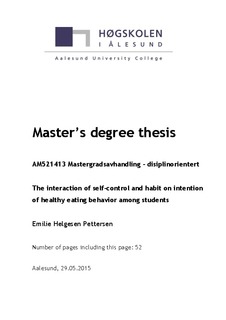The interaction of self-control and habit on intention of healthy eating behavior among students
Master thesis
Permanent lenke
http://hdl.handle.net/11250/301177Utgivelsesdato
2015Metadata
Vis full innførselSamlinger
Sammendrag
This study used the Theory of Planned Behavior to examine individual and social factors that
influence students at Aalesund University College in Norway to engage in healthy eating
behavior. The individual factors included in this study were those already included in the
Theory of Planned Behavior (attitude, perceived behavior and intention), as well as subjective
norms. However, in order for this study to be relevant today, an attempt was made to also
include two additional variables to see if they separately influenced students’ intention for
healthy eating behavior, but also if the interaction between them did too.
Participants in the study consisted of 117 students at Aalesund University College, all within
the age range of 18 to 50 years of age. 54,2% of the respondents were female. The
respondents were administered an online questionnaire and were asked to give demographic
information (age, gender, level of income and level of education). Included in the
questionnaire was also the measures of the Theory of Planned Behavior, Verplanken and
Orbell’s (2003) Self-Report Habit Index, and Baumeister and Boone’s (2004) 10-Item Self-
Scoring Self-Control Scale.
Results provided evidence that among Norwegian students, subjective norms, attitudes, habits
and the interaction between self-control and habit, significantly predict the intention to engage
in a healthy eating behavior for the next three months. These findings support five out of the
six stated hypothesis of this thesis. Perceived behavioral control did not show statistically
significant results to predict the intention for healthy eating behavior. This study did provide
some support to the addition of a habit-measure to the Theory of Planned behavior. That
being said, these results can only speak as to the inclusion of this variable when research is
focused on healthy eating among students similar to those in this study.

